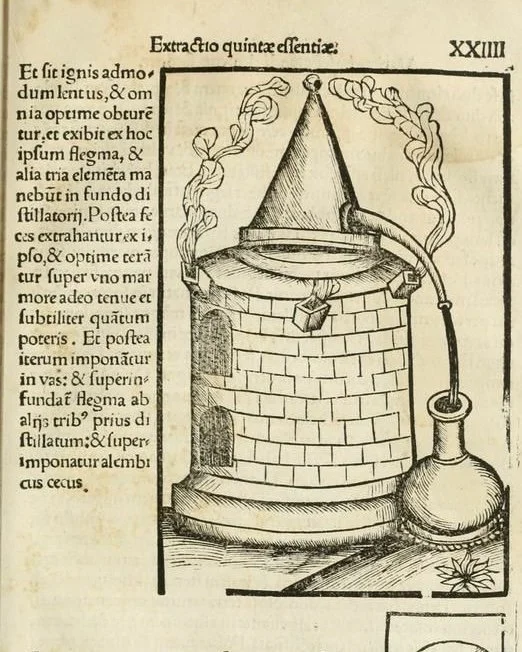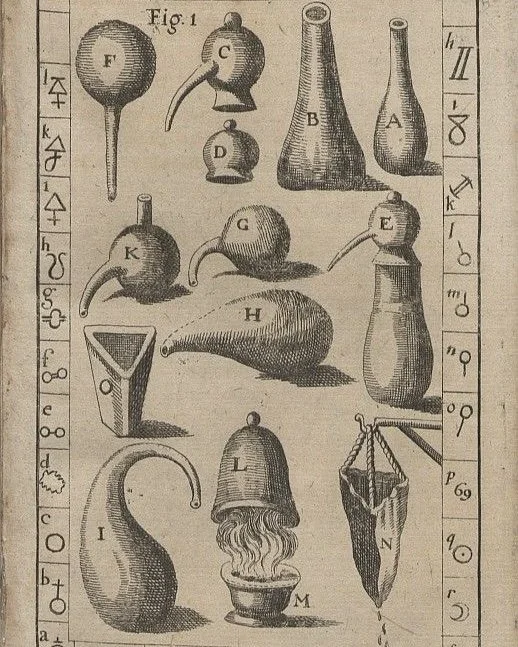The Soul of the Still: Copper's Legacy vs. Steel's Clarity in the Art of Essential Oil Distillation
Distillation is one of many ancient bridges between nature and magic. Magic once fully understood is then, perhaps, called science. Heat, water, patience, and the attention and wisdom of the distiller coax pure aroma from the depths of nature’s raw offering. In this alchemy, the vessel itself is not neutral.
Company founder Tony Bolton with two new stills in 2020.
For thousands of years, humanity has worked with copper, one of the first metals ever shaped by our hands. Easily smelted, abundant, and highly malleable, copper served as the vessel of alchemists, perfumers, and physicians.
In time, glass entered the laboratory, and much later, stainless steel stepped onto the stage, promising inertness as well as greater durability and industrial scalability. And so the question emerged: for aromatics as spiritually and chemically complex as sandalwood and agarwood, does copper still have a role, or does steel reveal some higher truth?
Copper: An Ancient Presence in the Process
Copper does not simply hold the raw materials and direct the steam. It participates. Copper binds with sulfur compounds, smoothing unwanted “rubbery”, “meaty” or “oniony” tones that occasionally arise in botanicals. This is not theory. The wine world, the whiskey world, and traditional attar-makers all concur here: copper softens and rounds harshness.
Science Note: Sulfur-compound interaction with copper
Studies show that copper surfaces actively bind or catalyze the removal of volatile sulfur compounds (thiols, disulfides) during distillation. For example, in studies of spirit distillation, copper stills reduced levels of dimethyl trisulfide (DMTS, threshold ~0.1 µg/L) compared with stainless steel, resulting in noticeably fewer sulfurous off-notes. Since sulfur compounds have strong odor thresholds, even trace reduction alters sensory perception of the finished oil. And so for fine fragrance distillation the choice of metal can influence aroma profile beyond basic practical purposes.
Its high thermal conductivity allows very even heating. That was essential for ancient distillers working with wood-fired stills, and it remains relevant in traditional alembics. Ancient Persian rose distillers worked in copper, as did countless generations of Indian attar makers. For millennia, this was not considered a correction. It was simply the way essential oils came into the world.
Science Note: Heat-transfer and material reactivity
Copper’s thermal conductivity (~400 W/m·K) is substantially higher than that of typical stainless steels (~15–30 W/m·K) under distillation conditions. This more rapid and uniform heat transfer means that vaporization and condensation can proceed with tighter thermal gradients which may preserve delicate sesquiterpene alcohols (such as α- and β-santalol in sandalwood) from thermal degradation.
As well, copper’s reactive surface may provide catalytic sites for minor secondary reactions (for example, converting or adsorbing sulfur species) whereas stainless steel largely remains chemically inert under steam distillation conditions.
In the case of sandalwood, copper tends to lend a slight roundness and warmth, letting its creamy santalol heart feel more luxurious, smooth, and full.
With Oud, the story becomes more dramatic. Agarwood is a wild, less predictable orchestra. Copper can soften barnyard / animalic tones and sulfurous shadows, smoothing the oil into a classical profile that many old-school distillers prize. Yet by polishing those edges, copper may also erase some of Oud’s wilder poetry: the primal leather, the fermented fruit, the wet wool note, or the musty temple incense aura. Whether this is a refinement or a loss depends entirely on personal philosophy and individual taste.
What about Rose?
It’s also worth noting that rose oil production traditionally involves copper stills (e.g., in Bulgaria, Turkey, Iran). Is this just tradition? Or is there something more to it? The high value and delicate fragrance demand fine thermal regulation and removal of off-notes. Copper stills in rose distillation mirror the principles described above: high heat transfer, sulfur binding, tradition. In contrast, when rose oil is distilled in steel, the profile may appear more transparent, but possibly less “rounded” in aroma.
Steel: The Modern Lens of Purity
Stainless steel entered perfumery much later, and with a different spirit. It is inert. It reacts with very little. It cleans easily. It’s extremely durable and puts almost no limit on equipment size and scale, making it perfect for large-scale modern industry. It does not shape aroma by contact or chemistry. Instead, it preserves precisely whatever fragrance molecules the raw material releases (under the chosen distillation parameters).
For sandalwood, steel can produce a profile that reads cleaner, clearer, more full spectrum woody and also more sharp and bright. It might be perceived as having more complex sparkling top notes, and overall would be more luminous and dynamic. It might also be erroneously perceived as younger, whether from younger trees or insufficient aging, especially by those more familiar with classically distilled “Mysore” style sandalwood oils.
With Oud, stainless steel unleashes everything the wood carries. The dark beauty, the strangeness, the funk, the sacred smoke, the animal, the must… Nothing is softened. Nothing polished away. For modern artisanal Oud distillers chasing terroir and truth, this is sometimes the preferred path. But purity is a double-edged sword. Steel preserves a raw totality, but it also preserves challenge and controversy. For the uninitiated nose, there will be nowhere to hide.
Science Note: Inert vessel preserving full volatile spectrum
Research into essential oil extraction emphasizes that factors such as distillation method, equipment material, moisture, acidity and gas-chromatography conditions all influence oil composition.
Using an inert vessel like stainless steel increases the likelihood that the volatile profile reflects the wood’s intrinsic chemistry (rather than vessel-induced modification). For example, when using steel, weakly bound sulfur compounds, phosphorus compounds or trace metals remain intact in the distillate – which may increase complexity, but also risk undesirable notes.
So Which Is Best?
The honest answer: Each serves a different philosophy. (And of course every different raw material must be considered by its own chemical distinctions.)
Copper honors tradition, smoothing and rounding in ways our ancestors believed created perfection. It delivers grace, comfort, historical continuity, and that beloved vintage softness in sandalwood and oud.
Stainless steel offers transparency. It gives the oil back exactly as nature made it, not as the still interprets it. It is a tool, not a collaborator.
What matters most is not the metal, but the intention behind the choice; the understanding of the raw material, and the artistry of the distiller. Material quality, soaking and fermentation if any, temperature control, timing, and an intuitive touch that only comes with experience all shape the final product more profoundly than the vessel alone.
Copper brings tradition. Steel brings precision. Both can lead to beauty.
What We Do (and prefer) at Aroma Sublime
At Aroma Sublime we place a subtle but deliberate preference on copper for our core focus of sandalwood and agarwood distillation. We believe that the warm rounding, the historical echo, and the aromatic refinement imparted by copper serve these woods’ depth and complexity beautifully. That said, we remain open-minded: we occasionally experiment with stainless steel, particularly when pursuing different expressions of a single material. For other aromatics such as frankincense, other sticky resins, and spices, we adopt stainless steel as our standard workhorse. Its extraction clarity and ease of equipment cleaning and maintenance make it ideal for those streams. When we experiment with a new raw material, we typically begin in steel to capture the full voice of the botanical, and, should the material warrant it and our sensory trials dictate, we may transition to copper to enhance and refine.
When we outsource these particular and more clearly copper-influenced essential oils, we strongly favor small-batch artisan distillers who work exclusively with copper stills (with occasional well-informed exceptions; we are willing and excited to be proven wrong). For other essential oils we outsource, the use of a copper still may not be relevant at all, or in some cases specifically contraindicated.
Our famous in-house White Plumeria (Frangipani) oil
To be honest, our choice to distill our own in-house Frangipani essential oil in copper is much more of a habit than a rational determination. Company founder Tony Bolton intuitively chose copper for the distillation of his incredibly low-yield and labor-intensive organic white plumeria essential oil right from the start. While specific data and studies on plumeria oil and still-metal effects are scarce, given the botanical complexity of frangipani (myriad esters, lactones, terpenes) we believe the use of a copper still supports a more aromatically balanced final product and reduces risk of green/sulfurous edges. We truly believe that our Frangipani oil stands out among other Frangipani extractions available in the market as a kind of pinnacle product reflecting our particular artisanal style, leaning gently into tradition and history; as well as a product of exceptional quality, purity, and refinement. We are very proud of this work.
Importantly, for every single Aroma Sublime product, we will tell you in the product description whether it was distilled in copper or steel so that you can make your own determinations.
_______________________
"Oud" versus "agarwood" disambiguation: For our purposes, here on the Aroma Sublime website, "Oud" will usually refer to the essential oil of agarwood, and "agarwood" to the raw wood itself. This website's terminology seeks to reflect the most common English usage for each form of the materials. It should be noted that for many English speakers, "Oud" might also refer to the raw wood, particularly among connoisseurs. As well, In Arabic speaking countries, from where the word Oud originates, both agarwood in raw wood form, and its essential oil, and really anything else made with it, are commonly referred to as "Oud" (عود).




